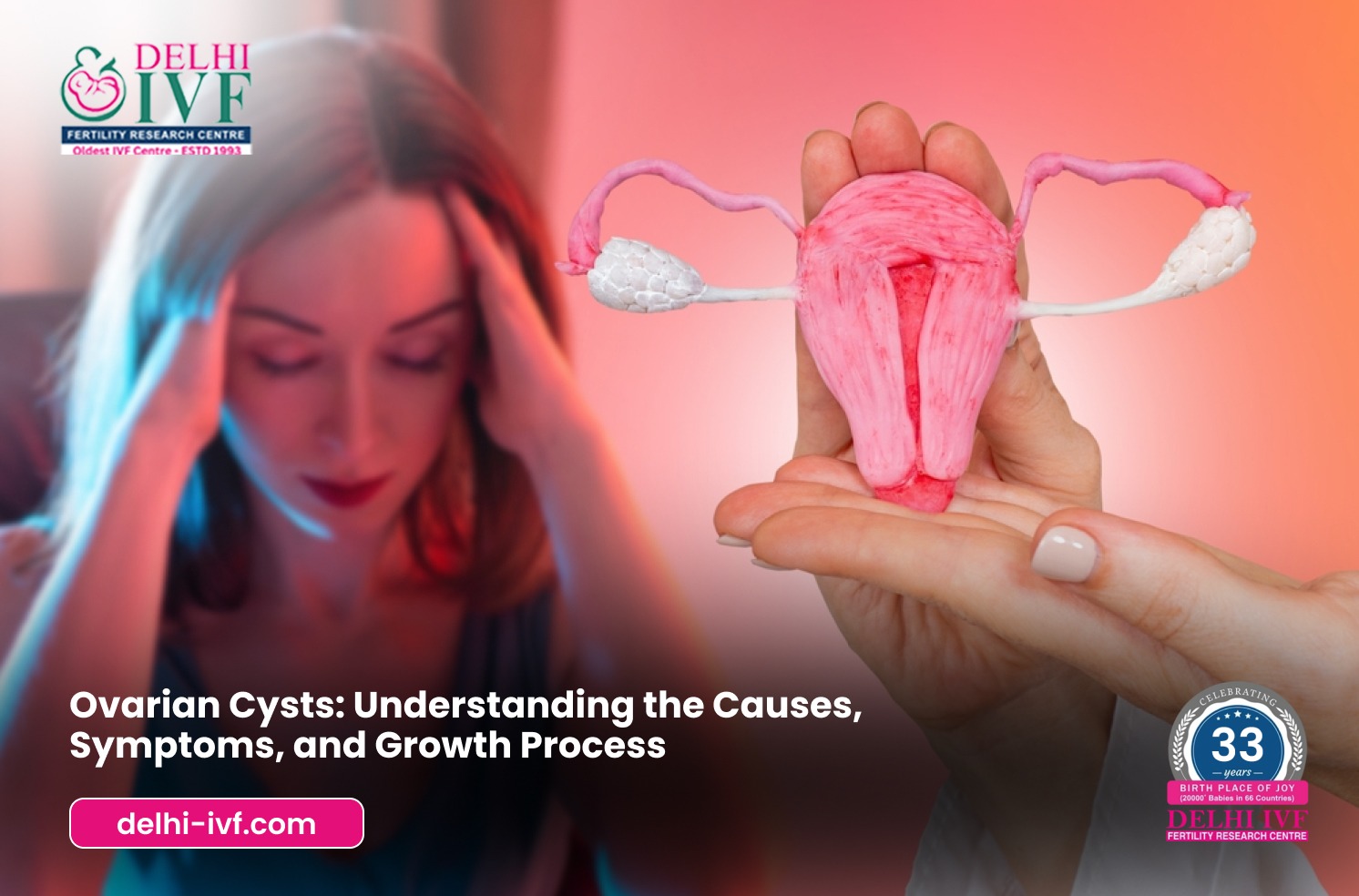Understanding Ovarian Cysts
Ovarian cysts are fluid-filled sacs that develop on or inside the ovaries. They are common among women of reproductive age and are usually harmless, often resolving on their own without causing symptoms. However, some cysts can grow larger, rupture, or cause complications that require medical intervention
Understanding the causes of ovarian cysts can help in their prevention and management of ovarian cysts.
Common Causes of Ovarian Cysts
1. Hormonal Imbalance
One of the most common causes of ovarian cyst formation is a hormonal imbalance. This can occur due to:
- Irregular menstrual cycles: Hormonal fluctuations can disrupt ovulation, leading to cyst formation.
- Excess estrogen or progesterone: Can lead to the development of cysts.
- Birth control pills: Some contraceptives prevent ovulation, reducing cyst formation, while others may contribute to hormonal imbalances.
- Polycystic ovary syndrome (PCOS): A condition where multiple small cysts develop due to hormonal imbalances is known as PCOS.
2. Ovulation Issues
Every month, an ovary releases an egg inside a fluid-filled sac called a follicle. Sometimes, this process does not happen correctly, leading to ovarian cyst formation.
- Follicular cysts occur when the follicle fails to rupture and release an egg.
- Corpus luteum cysts develop when the follicle releases an egg but fails to shrink, leading to fluid accumulation.
3. Endometriosis
Endometriosis is a condition where the tissue that normally lines the uterus grows outside it, including on the ovaries. This can lead to the formation of endometriomas (chocolate cysts), which contain old blood and tissue. These cysts can cause severe pain, especially during menstruation.
4. Pregnancy
During early pregnancy, a corpus luteum cyst may form to support the pregnancy by producing progesterone. While this type of cyst usually disappears on its own, in some cases, it can grow larger and cause complications.
5. Pelvic Infections
Severe pelvic infections, especially pelvic inflammatory disease (PID), can spread to the ovaries and lead to the formation of pus-filled cysts known as abscesses. These cysts require medical treatment, as they can lead to serious complications if untreated.
6. Genetic and Lifestyle Factors
Some women may be genetically predisposed to developing ovarian cysts. Additionally, certain lifestyle factors, such as poor diet, lack of exercise, and obesity, can contribute to hormonal imbalances that lead to cyst formation.
Ovarian cysts are fluid-filled sacs that form in or on the ovaries. While many cysts are harmless and disappear on their own, some may cause discomfort and require medical attention. Recognizing the symptoms early can help in choosing the right ovarian cysts treatment and avoiding potential complications.
Common Symptoms of Ovarian Cysts
1. Pelvic Pain and Discomfort
- Mild to severe pain in the lower abdomen, typically on one side.
- Can be dull, sharp, or sudden, depending on the ovarian cyst complexity.
- Pain may worsen before or after menstruation.
2. Abdominal Bloating or Swelling
- A noticeable increase in abdominal size.
- Feeling of fullness or heaviness in the lower abdomen.
- This can indicate a large or growing cyst, requiring an ovarian cysts solution.
3. Irregular Menstrual Cycles
- Delayed, missed, or heavy periods.
- Spotting between periods.
- Hormonal imbalances caused by cysts may disrupt the normal menstrual cycle.
4. Pain During Intercourse
- Discomfort or sharp pain during or after intercourse.
- This may be a sign of a deep-seated or complex ovarian cyst.
5. Frequent Urination or Difficulty Emptying the Bladder
- A cyst pressing against the bladder can lead to increased urination.
- Difficulty in fully emptying the bladder can be a sign of ovarian cyst complexity.
6. Nausea and Vomiting
- If an ovarian cyst twists (ovarian torsion) or ruptures, it can cause severe nausea and vomiting.
- Requires immediate ovarian cysts treatment to prevent complications.
7. Lower Back or Thigh Pain
- Some ovarian cysts cause referred pain in the lower back or thighs.
- This symptom is more common in larger cysts that press on nerves.
8. Difficulty in Bowel Movements
- Constipation or difficulty passing stool.
- This can occur if a cyst is pressing against the rectum.
Severe Symptoms Requiring Immediate Medical Attention
- Severe, sharp abdominal pain (could indicate a ruptured cyst).
- Rapid breathing, dizziness, or fainting (signs of internal bleeding).
- Fever with pelvic pain (possible infection or ovarian torsion).
Ovarian Cysts Treatment: A Complete Guide
Ovarian cysts are fluid-filled sacs that develop on or inside the ovaries. Many cysts are harmless and disappear on their own, but some may cause pain, irregular periods, or complications. In such cases, proper ovarian cysts treatment is necessary to prevent health issues.
How is Ovarian Cysts Treatment Done?
1. Watchful Waiting (Observation Method)
- If the cyst is small and not causing symptoms, doctors may suggest watchful waiting.
- Regular ultrasound check-ups help monitor if the cyst grows, shrinks, or disappears on its own.
- Most functional ovarian cysts resolve within a few menstrual cycles.
2. Medications for Ovarian Cysts
- Birth Control Pills (Oral Contraceptives): These pills regulate hormones and help prevent new cysts from forming. They do not shrink existing cysts but reduce the risk of future ovarian cyst formation.
- Pain Relievers: Over-the-counter medications like ibuprofen or acetaminophen help manage pain caused by ovarian cysts.
3. Minimally Invasive Surgery for Ovarian Cysts
If a cyst is large, causing pain, or showing signs of ovarian cyst complexity, doctors may recommend surgery.
Laparoscopy (Keyhole Surgery)
- Used for small, benign (non-cancerous) cysts.
- A small incision is made in the abdomen, and a camera (laparoscopey) is inserted to remove the cyst.
- Less scarring, faster recovery, and minimal complications.
- Often used for simple ovarian cysts or functional cysts.
Laparotomy (Open Surgery)
- Used for larger cysts or suspected cancerous cysts.
- A larger incision is made in the abdomen to remove the cyst.
- Requires a longer hospital stay and recovery time.
- This procedure is recommended when doctors suspect an ovarian tumor or complex ovarian cyst.
4. Treatment for Ovarian Cysts with Complications
Some ovarian cysts cause severe symptoms and require urgent medical care.
- Ruptured Ovarian Cyst Treatment: A ruptured cyst may cause internal bleeding and severe pain. Emergency surgery is required in extreme cases.
- Ovarian Torsion Treatment: When an ovarian cyst twists the ovary, cutting off blood supply, immediate surgery is needed to save the ovary.
5. Natural and Lifestyle-Based Ovarian Cysts Solution
In some cases, lifestyle changes can help manage ovarian cyst symptoms and prevent new cysts.
- Healthy Diet: Eating a balanced diet with anti-inflammatory foods (fruits, vegetables, whole grains) can support hormone balance.
- Regular Exercise: Helps in weight management and reducing insulin resistance, which is linked to polycystic ovary syndrome (PCOS).
- Stress Management: High stress can disrupt hormones, leading to cyst formation. Practicing yoga, meditation, and deep breathing can help.
When to See a Doctor for Ovarian Cysts Treatment?
Seek medical help if you experience:
- Severe abdominal or pelvic pain.
- Bloating or rapid swelling.
- Pain during intercourse.
- Heavy or irregular menstrual bleeding.
- Fever, nausea, or vomiting (signs of infection).
Can Ovarian Cysts Affect Fertility?
While most cysts do not interfere with conception, conditions like PCOS and endometriosis-related cysts may affect fertility. Seeking early medical advice can help manage symptoms and improve reproductive health.
Most ovarian cysts are harmless, but if they cause discomfort or complications, timely ovarian cysts treatment is essential. Whether through watchful waiting, medications, or surgery, the right approach depends on the cyst’s size, type, and symptoms.
At Delhi IVF, we specialize in providing advanced ovarian cysts solutions, helping women overcome fertility challenges caused by ovarian cysts. Our team of experienced fertility specialists carefully evaluates each case, offering personalized treatments to improve ovarian health. With cutting-edge reproductive technology, hormonal therapies, and minimally invasive procedures, Delhi IVF has helped countless women with ovarian cysts achieve successful pregnancies. If you are struggling with ovarian cyst complexity and its impact on fertility, our expert team is here to guide you on the journey to parenthood with the best medical care and support.


 Your Journey to Parenthood Begins with us!
Your Journey to Parenthood Begins with us!